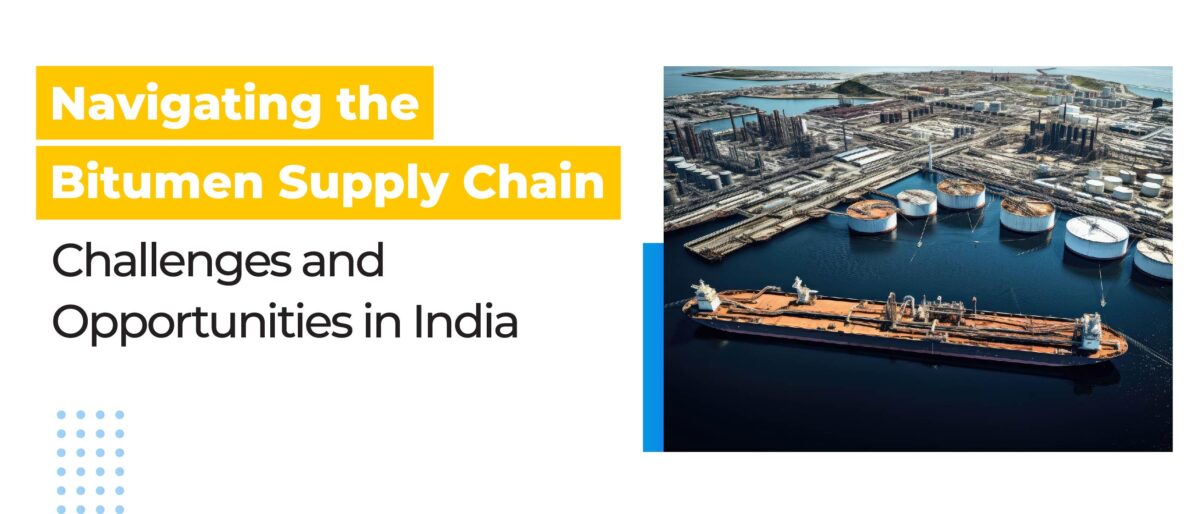I. Introduction
India, with its vast network of roads and ambitious infrastructure projects, relies heavily on bitumen, a crucial binding agent in road construction. As the country marches towards sustainable development and economic growth, the efficiency and resilience of the bitumen supply chain become paramount. In this blog, we delve into the intricacies of the bitumen supply chain in India, exploring the challenges it faces and the promising opportunities for improvement.
II. Current State of the Bitumen Industry in India:
India stands as one of the largest consumers of bitumen globally, driven by its ambitious infrastructure development plans. With an extensive network of roads connecting the length and breadth of the nation, bitumen plays a pivotal role in ensuring the durability and longevity of these roadways. However, despite being a significant consumer, India’s domestic production capacity for bitumen falls short of meeting its growing demand. Consequently, the country heavily relies on imports to bridge this gap.
III. Challenges in the Bitumen Supply Chain:
The bitumen supply chain in India faces multifaceted challenges that hinder its efficiency and reliability. One of the primary challenges is the shortage of domestic production capacity. While India possesses substantial reserves of bitumen, the lack of adequate processing facilities limits its ability to meet the burgeoning demand. As a result, the country heavily depends on imports from countries like Iran and the UAE, exposing the supply chain to geopolitical risks and price fluctuations.
Transportation and logistics present another significant challenge in the bitumen supply chain. India’s vast geographical expanse and diverse terrain make transportation of bitumen from production centers to consumption hubs a daunting task. Poor road infrastructure, congestion at ports, and inadequate storage facilities further exacerbate these logistical challenges, leading to delays and inefficiencies in the supply chain.
Quality control issues also plague the bitumen supply chain in India. Inconsistent quality standards and the lack of standardized testing procedures pose serious concerns regarding the performance and durability of road pavements. Poor-quality bitumen not only compromises the structural integrity of roads but also escalates maintenance costs in the long run.
Regulatory hurdles and policy constraints add another layer of complexity to the bitumen supply chain. Inconsistent taxation policies, bureaucratic red tape, and delays in project approvals create uncertainties for stakeholders, hindering investments in the sector and stifling innovation.
IV. Opportunities for Improvement:
Despite the challenges, the bitumen supply chain in India presents promising opportunities for improvement. One such opportunity lies in enhancing domestic production capacity through investments in new refining facilities and technological upgrades. By bolstering domestic production, India can reduce its reliance on imports, enhance supply chain resilience, and create employment opportunities in the domestic market.
Adoption of advanced technologies holds immense potential in optimizing various aspects of the bitumen supply chain. From enhanced refining processes to innovative packaging and storage solutions, technology-driven interventions can streamline operations, reduce wastage, and improve overall efficiency.
Collaboration between government, industry, and research institutions is crucial in addressing quality control issues and standardization in the bitumen supply chain. Establishing robust quality assurance mechanisms, conducting regular inspections, and promoting adherence to international standards can instill confidence in the quality of bitumen used in road construction projects.
Exploration of alternative sources and sustainable practices also offers promising avenues for the bitumen industry in India. Research into bio-based bitumen alternatives, recycling of bitumen from reclaimed asphalt pavement (RAP), and adoption of eco-friendly additives can contribute to reducing environmental impact and promoting sustainability in road construction.
V. Conclusion
The bitumen supply chain in India is at a crossroads, facing significant challenges but also brimming with opportunities for improvement. Addressing the shortage of domestic production capacity, enhancing transportation infrastructure, ensuring quality control, and streamlining regulatory processes are imperative for unlocking the full potential of India’s bitumen industry. By embracing innovation, fostering collaboration, and adopting sustainable practices, India can build a robust and resilient bitumen supply chain that fuels its infrastructure aspirations for years to come.

